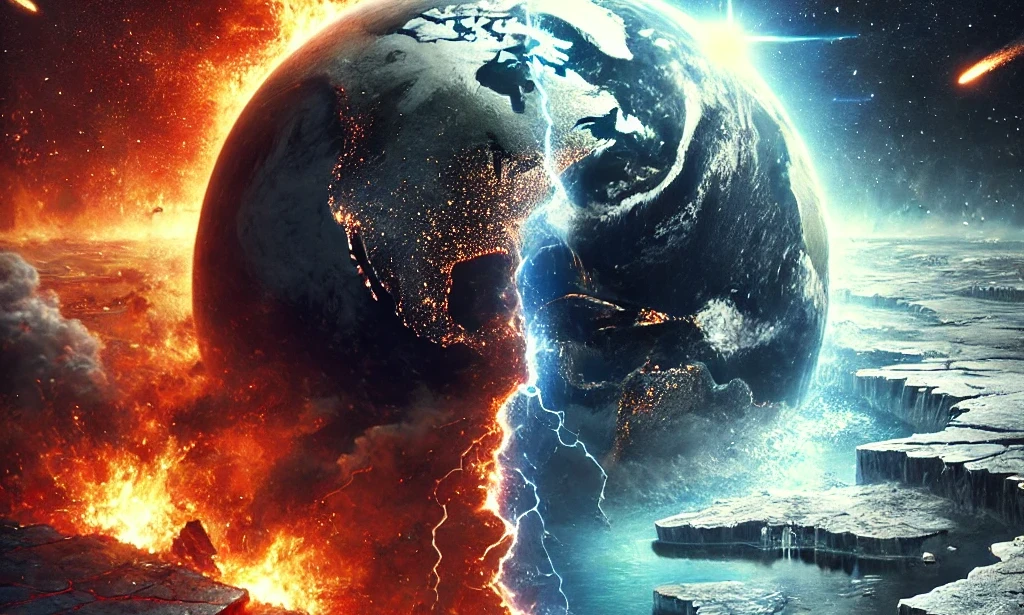The concept of the end of the world has fascinated humanity for centuries, inspiring myths, religious beliefs, scientific theories, and creative works. While often viewed through an apocalyptic lens, the idea raises profound questions about human existence, resilience, and the forces shaping our planet’s future. But what could bring about such an event, and how might humanity respond?
Potential Causes of the End of the World
1. Natural Disasters
Earth has faced catastrophic events throughout its history, such as asteroid impacts, supervolcano eruptions, and massive earthquakes. The asteroid that wiped out the dinosaurs 66 million years ago is a stark reminder of nature’s destructive power. While such events are rare, the possibility of another large-scale disaster cannot be ruled out.
2. Climate Change
A gradual but escalating threat, climate change poses significant risks to life on Earth. Rising temperatures, melting polar ice caps, and increasing sea levels threaten ecosystems, agriculture, and human settlements. If left unchecked, the cascading effects of climate change could result in food and water scarcity, mass migrations, and societal collapse.
3. Pandemics
The COVID-19 pandemic demonstrated how quickly a virus can spread globally, disrupting economies and overwhelming healthcare systems. A more lethal and uncontainable pathogen could potentially decimate populations and cripple civilization.
4. Nuclear War
The existence of nuclear weapons raises the specter of global annihilation. A large-scale nuclear conflict would cause immediate destruction, followed by a "nuclear winter" that could render the planet uninhabitable.
5. Artificial Intelligence (AI) and Technological Risks
As AI and advanced technologies evolve, concerns about their misuse or unintended consequences grow. Scenarios where AI surpasses human control, or where biotechnology creates uncontrollable threats, highlight the dangers of poorly managed innovation.
6. Astronomical Events
Cosmic phenomena, such as gamma-ray bursts or solar flares, could pose existential threats. While extremely rare, such events could disrupt Earth’s atmosphere or electromagnetic systems, leading to catastrophic consequences.
7. Human Negligence or Overpopulation
Overexploitation of natural resources, deforestation, and unsustainable practices could lead to ecological collapse. Combined with overpopulation, these factors might strain the planet beyond its capacity to support life.
Human Resilience and Preparedness
Despite these potential threats, humanity has demonstrated remarkable resilience throughout history. Scientific advancements, international cooperation, and proactive measures can mitigate risks and prevent certain disasters. For instance:
Space agencies monitor near-Earth objects to prevent asteroid collisions.
Climate agreements aim to reduce greenhouse gas emissions.
Research into global health security prepares for future pandemics.
Philosophical Implications
The idea of the end of the world prompts deep philosophical questions:
What legacy do we want to leave behind?
How should we balance technological progress with ethical considerations?
Can humanity achieve sustainable living and avoid self-destruction?
Hope for the Future
While apocalyptic scenarios are daunting, they also serve as a call to action. By prioritizing environmental conservation, global collaboration, and ethical governance, humanity can work toward a more secure future. The end of the world is not inevitable, but the choices we make today will shape the course of tomorrow.
Conclusion
The end of the world, whether through natural or human-made causes, remains a subject of speculation and concern. However, it also offers an opportunity for reflection and action. By addressing the challenges we face and fostering resilience, humanity can strive to ensure that
our planet remains a thriving home for generations to come.


good news great things
You must be logged in to post a comment.